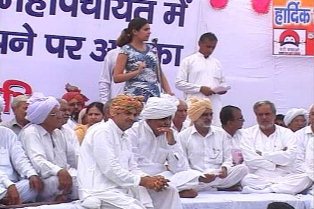
Chandigarh, July 16: Haryana Chief Minister Bhupinder Singh Hooda on Sunday announced Rs one crore for the development of a village where a Khap Mahapanchayat termed female foeticide as a "heinous act" and demanded murder charges be slapped against those involved in the illegal practice.
The chief minister has announced the money for village Bibipur in Jind district as its residents especially women have taken the initiative to condemn female foeticide, an official spokesman said on Sunday.
According to Hooda, the initiative by village residents will inspire others to bring about positive social changes not only in Haryana, but in other parts of the country also.
The Khap Mahapanchayat, which for the first time saw a large number of women participants, was held in Bibipur village, where it was also decided that a campaign would be launched against the rampant social evil.
The Mahapanchayat or a conglomeration of various caste councils, attended by several Khaps from Haryana, Rajasthan and Uttar Pradesh, was held to create awareness among people against the social malady.
It was pointed out that due to female foeticide the population of girls has decreased, therefore, effective steps should be taken to prevent this social ill.
The Chief Minister said that other Khap Panchayats should come forward to launch a mass movement against such social evils.
Hooda said the state government has launched several programmes to check the menace of female foeticide, but the efforts could derive the desired results only through a whole-hearted support from the people.
By undertaking measures to prevent female foeticide, the Khap Panchayat can show to the country the importance of social bodies in bring positive changes, he said.






Comments
Add new comment